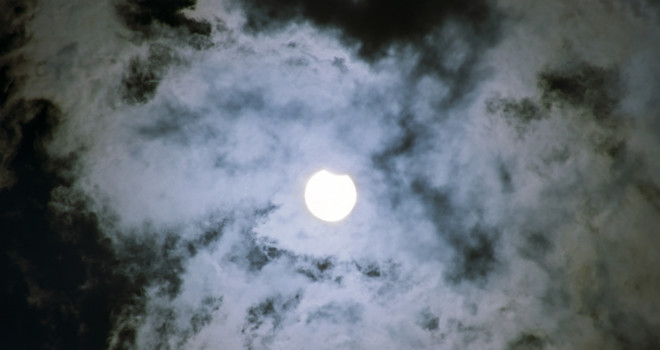Saint of the Day for August 23: Saint Rose of Lima (April 20, 1586 – August 24, 1617)
August 23, 2017Fr. Mark Goring: Place of Greatest Miracles
August 23, 2017
By Danielle Marie Heckenkamp, Catholic Exchange, Aug. 23, 2017
There is nothing more enticing than to plan our entire schedule around a singular event, in this case the solar eclipse, only to find our nothingness among God’s greatness. In a fast-paced world, much of society is overcome with daily demands that usually connect us to technology. As necessary as technology may be, it also quickly envelopes us into a self-absorbing world where we forget to focus our eyes on the reason for our existence – God and eternal life.
When an event, such as the solar eclipse, travels across the United States, the world stops. We wait for a miracle, something that can be explained by science, but still draws our imagination into an unknown world. We wait and watch for the wonder to begin, even if that means we must drive hours to reach the path of totality, and several more hours to return home after the traffic jam. This wonder and excitement brings us together as a society, but it does something even bigger. We are brought together as God’s loving creatures with a unified desire to witness a “miracle”. The solar eclipse is one circumstance that proves our thirst for something bigger than ourselves – a reason for our existence and proof that each one of us, each animal, each tree, has a specific place in this world.
As we search for this extraordinary experience, we fail to remember that we have an even more powerful miracle present at our finger-tips each and every day – the Holy Eucharist. It is not always easy in this busy world to remain transfixed upon the King of Kings, present in the Tabernacle twenty-four hours a day, but it is necessary that we strive each day to focus our attention upon his presence in this world. We can comfort in recognizing her similarities to St. Peter who only remained steady while walking on water when his eyes rested upon Our Lord. St. Peter only began to sink when his attention was redirected to the winds and dangers surrounding him. And as this dear apostle began to sink, Our Lord reached out his hand without hesitation and said “why did you doubt me?” (Matthew 14:31) It was the worldly distractions that brought St. Peter to lose faith in Jesus, just as we too often do ourselves.
If we continue to search for consolations among God’s creations, we will never find true happiness. Yes, we can marvel at these beauties and intricacies that God created out of love, but we must remember that these are only a small glimpse into His majesty. We are beginning to sink as we dwell upon the shifting winds and tragedies of the world, just as St. Peter also lost focus. It is easy to forget that our desire for goodness and wonder is oftentimes empty. The focus has become distorted as we search for a solution in the empty pleasures of this world. We can admire the forces of nature and the natural wonders, but we ultimately must remember that these are natural wonders created by God who is much greater than any astronomical event.
The interior struggle between body and soul is real and it pulls us in many directions, just as St. Peter began to sink into the water. Yet, there is only one way to rise above the tide, and that is with the Holy Eucharist. As Catholics, we must focus our attention on our purpose – to know, love, and serve God not only in this world, but with the desire to do so in heaven too.
The winds are strong, but so are the graces of God and no matter where the path of totality may lay for the solar eclipse in seven years, Our Lord will always remain steadfast in all the Tabernacles throughout the world. So, as much as we can admire this astronomical occurrence, there is a more perfect miracle waiting for us each second of every day and that is the True Body and Blood of Christ present in all the Tabernacles. That is where we will find everlasting life, that is where we will remain focused on Our Lord and our reason for our existence, that is where we will find God’s love for us. Just as God created the heavens and the earth, so He created us with an overflowing fountain of love and mercy, but it is up to us to reach for those Divine Graces. Our Lord does not force us to love, our free will is a gift. But in order to desire these graces, we must recognize our weakness and nothingness with the desire to give up control because God has a much bigger and better plan. Just as we admired the solar eclipse, we also accepted the loss of the sun for a few minutes and welcomed the miracle that lay within that loss. So, let’s search for the miracles within the Holy Eucharist, and when we recognize our nothingness only then will we be able to focus our attention solely on God and His Majesty.







